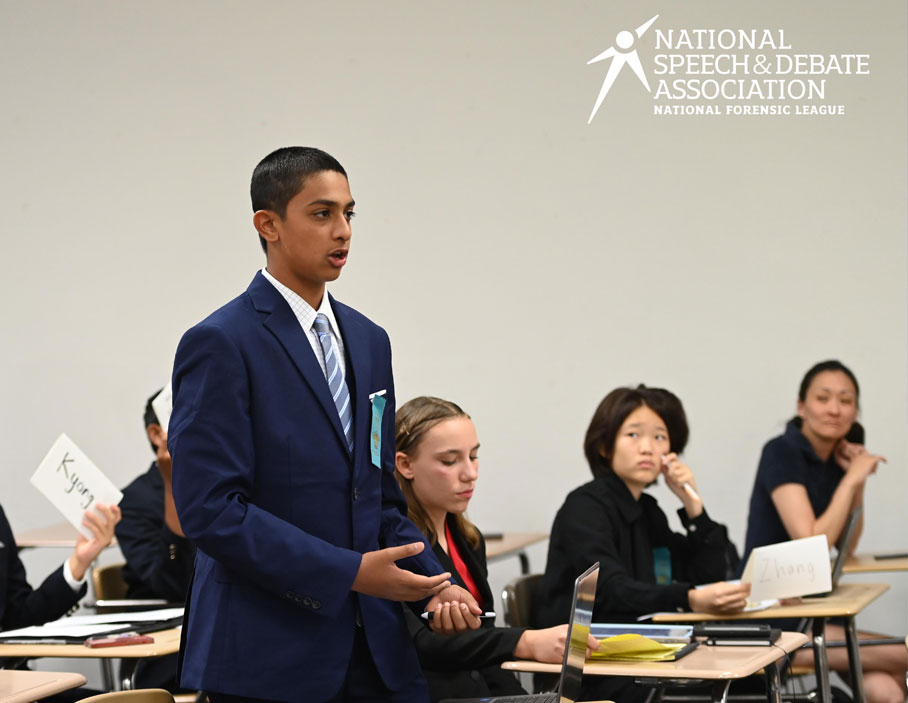Judging Congress

Congress Round Overview
Choose a tab below for more info!
What to Expect
- In Congressional Debate, judges preside over a room of students as they simulate the United States Congress’ process for debating legislation.
- There are typically three judges in Congressional Debate who will evaluate students independently.
- A typical Congress round, often referred to as a session, lasts longer than rounds for other speech and debate events.
- A typical round of Congress is three to four hours long, and there is often a morning and afternoon session with a break in between.
- As students debate proposed bills and resolutions, you will evaluate each speech that is given during the round.
Presiding Officer and Parliamentarian
- Congressional Debate uses Robert’s Rules of Order, a manual describing parliamentary procedure, with which most competitors will be familiar.
- However, you don’t need to be an expert to judge Congressional Debate!
- At the beginning of each session, each house will elect a Presiding Officer (PO), a competitor who will abstain from speaking in order to orchestrate the proceedings. The PO will do things like keep time, call for speakers, count votes, etc.
- Judges may be given a special ballot to evaluate the PO, or judges may be asked to rank the PO’s overall performance relative to the other speakers’ relative performances in their room.
- There will be multiple judges in one round of Congressional Debate, and one of them will be named the Parliamentarian (Parli) by the tournament organizers before the round begins.
- The Paril is a judge who is experienced with Robert’s Rules of Order and the rules of Congressional Debate. They will act as a resource for the PO and help them navigate running the chamber as needed.
Take Notes on Each Speech
- At the end of the session, you will assign a point value to each speech that is given, typically on a scale of 1-6, with 6 being outstanding.
- You will also have the opportunity to give feedback on each speech, including suggestions for improvement and comments about what the speaker did well.
- Since each session will include several speeches, it’s best to give points and write comments on each speech as the session goes on instead of waiting until the end.
Be Attentive
- Minimize anything that could be distracting for the performers like cell phone notifications and make it clear that you are giving the competitors your full attention.
- Perception can be reality for performers. For example, if you are judging online, you may be fully attentive while your camera is off, but the competitors cannot tell!
Complete Your Ballot
At the end of the session, you can take a few minutes to look over your notes. Then, you will complete your ballot. The ballot will ask you to:
- Rank Competitors: You will rank competitors from best to worst in the round. The best competitor will receive a ranking of 1, the second best will receive a ranking of 2, and so on. At many tournaments, judges will be instructed to rank the top 8 and give all other speakers in the room a tied rank of 9.
- Assign Speech Scores: You will also assign a point value to each speech a student gave on a scale of 1-6, with 6 being outstanding.
- Add Comments: Many ballots will ask you to write comments for each student describing what they did well and what they could do better. The students and their coaches receive this feedback at the end of the tournament and use it to improve!
After your ballot is complete, you should return it to the tournament organizer in person or electronically, depending on the tournament’s procedures.
Congress Judging Resources
Intro to Congressional Debate
Dive into an introduction to the basics of Congressional Debate
How to Judge Congressional Debate for Beginners
In this webinar, we guide you through Congress basics and provide a thorough explanation of this exciting event.
Congressional Debate Round Intro
This video breaks down an introductory Congress round, explaining the role of the PO, authorship and sponsorship speeches, precedence, affirmative and negative speeches, questioning, and voting as the elements unfold on screen.
Congressional Debate Sample Ballot
Download a sample comment ballot for Congressional Debate. Use this sheet to learn how to judge Congressional Debate at an invitational tournament.
Congressional Debate Judging Forms
Download the Congressional Debate Judging Forms.
Congressional Debate Guide
Review judging instructions for Congressional Debate beginning on page 43 (Unit 10).
